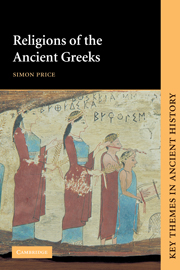Book contents
- Frontmatter
- Contents
- List of figures
- Preface
- List of abbreviations
- 1 Introduction
- 2 Gods, myths and festivals
- 3 Religious places
- 4 Authority, control and crisis
- 5 Girls and boys, women and men
- 6 Elective cults
- 7 Greek thinkers
- 8 Reactions to Greek religions
- Appendix of Greek inscriptions in translation
- Bibliographical essay
- Bibliography
- Index
- Frontmatter
- Contents
- List of figures
- Preface
- List of abbreviations
- 1 Introduction
- 2 Gods, myths and festivals
- 3 Religious places
- 4 Authority, control and crisis
- 5 Girls and boys, women and men
- 6 Elective cults
- 7 Greek thinkers
- 8 Reactions to Greek religions
- Appendix of Greek inscriptions in translation
- Bibliographical essay
- Bibliography
- Index
Summary
In 402 bc Cyrus the Younger raised an army, including 13,000 Greek mercenaries, to depose his brother from the Persian throne. Among these mercenaries was Xenophon, whose account of his experiences, the Anabasis, brings Greek religions to life for us. The Anabasis recounts the march of Cyrus’ army from the west coast of Asia Minor to Assyria, where Cyrus died in battle, and the subsequent retreat of the ‘10,000’ Greeks to a Greek settlement on the north coast of Asia Minor.
Throughout the march of the 10,000, divine guidance was sought for the actions of the group and of individuals. Before the army went into action animals were sacrificed to the gods; professional diviners (manteis) inspected the entrails of the animals to determine whether the gods favoured the proposed action. Divine assent was far from automatic: sometimes plans were aborted because of unfavourable sacrifices; and sometimes sacrifices were offered repeatedly in the hope of obtaining a definite response.
Individuals too sought divine guidance. Uncertain about joining the expedition in the first place, Xenophon decided to consult the oracle of Apollo at Delphi. He enquired to which of the gods he should sacrifice and pray in order for his participation to be a success (3.1.5–8). Another Greek who was eager to become commander of the force sacrificed to the gods for three days, but gave up on his plans when the sacrifices did not prove favourable (6.6.36).
- Type
- Chapter
- Information
- Religions of the Ancient Greeks , pp. 1 - 10Publisher: Cambridge University PressPrint publication year: 1999

